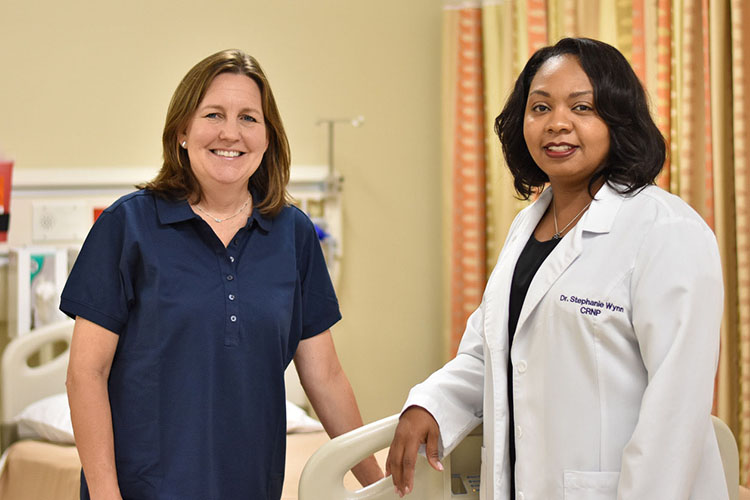
Samford’s Ida Moffett School of Nursing and School of Public Health have received a three-year, $1.3 million grant that will soon expand its community-based experiential student training. The new funds allow psychiatric mental health nurse practitioner and social work students to be trained on substance use disorder prevention, treatment and recovery services with a focus on opioid use disorder.
According to the Centers for Disease Control and Prevention, nearly 68% of drug overdose deaths are attributed to opioids, a drug used to reduce pain. Alabama has the highest opioid prescription rate in the nation and has seen a 26% increase in drug-related deaths over the past five years. An average of nearly 130 Americans die every day from an opioid overdose, and rates of drug overdose deaths are rising in rural areas, surpassing rates of urban areas.
“The misuse of and addiction to opioids has become a national crisis and has increasingly become a major health concern in our state,” said Nena F. Sanders, vice provost of Samford’s College of Health Sciences and nursing school dean. “By training our nurse practitioner and social work graduates to provide better pain management tactics and more effective addiction prevention, treatment and recovery services, we can improve the behavioral health care needs of our rural, medically underserved communities.”
Over the course of three years, the grant will provide trainee stipends to approximately 50 students studying to become behavioral health professionals. Students will begin training July 2020.
The program will also seek to increase the number of behavioral health professionals placed in rural and underserved areas of high demand. Since 2016, 93% of graduates from Samford’s nurse practitioner program and 75% of social work graduates have accepted positions in medically underserved communities.
“Several complexities occur when providing care for individuals with opioid use disorder and other substance use disorders,” said Stephanie Wynn, Ida Moffett School of Nursing professor and grant manager. “In medically underserved communities, we see a shortage of primary care providers. Compiled with a shortage of behavior health professionals, this creates a pattern of individuals developing addictions, suffering from substance abuse and not receiving necessary treatment.”
Fifty-five of Alabama’s 67 counties are considered rural and 53 are considered medically underserved and 66 are designated as mental health professional shortage areas.
“The addition of behavioral health professionals specifically, psychiatric mental health nurse practitioners and social workers, within these communities will expand the capacity to perform diagnostic evaluations, oversee the medical and psychotherapeutic management of individuals, and the identification and management of complex behavioral health issues,” said Wynn.
Samford’s $1,342,320 Opioid Workforce Expansion Program Professional grant from the U.S. Department of Health and Human Services, Health Resources and Services Administration is the largest award in the state. The interprofessional nature of the grant supports the college’s commitment to interdisciplinary curriculum that empowers students to learn with, from and about each other.
Samford’s Ida Moffett School of Nursing offers an online Doctor of Nursing Practice psychiatric mental health nurse practitioner curriculum for nurses who already possess a master’s degree in nursing. A Master of Science in Nursing with a psychiatric mental health nurse practitioner specialty is also available for registered nurses holding an associate’s degree in nursing or bachelor’s degree in nursing. An advanced practice registered nurse certificate is also available. The School of Public Health’s Master of Social Work program offers flexible online and on campus options.
